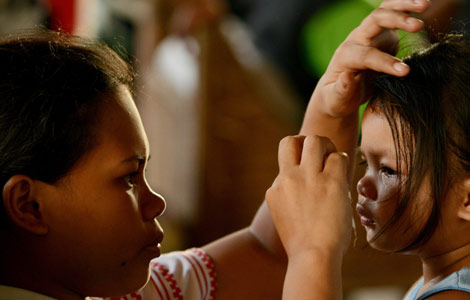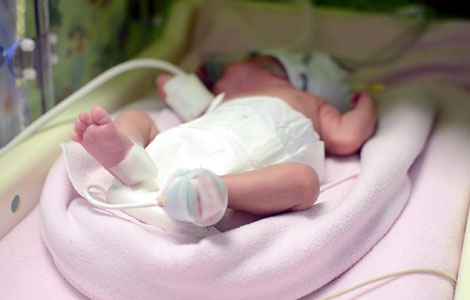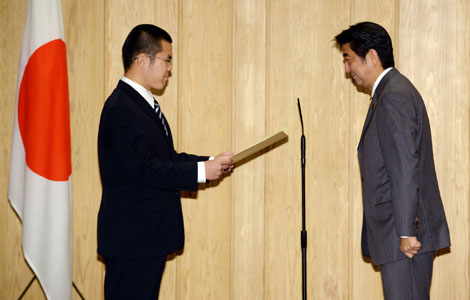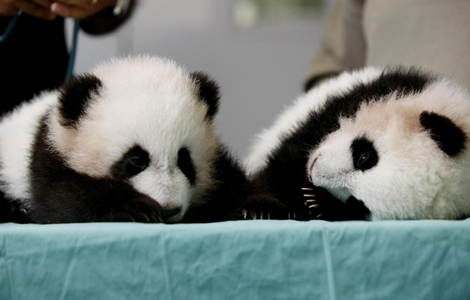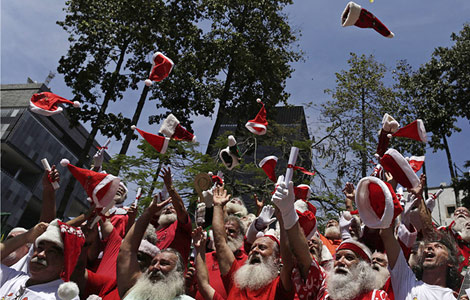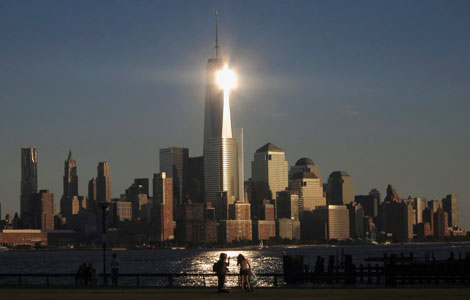

|
Bruno Paumard believes great winemakers need powerful passions for life. Photos by Wang Kaihao / China Daily |
A vintner is on a mission in western China's desert. Wang Kaihao reports in Wuhai, Inner Mongolia.
Holding a glass of red wine and wandering in the underground cellar packed with more than 1,600 oak barrels, Frenchman Bruno Paumard stops from time to time to sniff and sip. He touches the barrels gently, as if caressing his baby.
"Oh, what a nice wine," he murmurs.
The 49-year-old winemaker at Chateau Hansen in the Inner Mongolia autonomous region's Wuhai didn't expect that his first visit to China in 2005 would make him immediately decide to settle down in the country.
"It is all for love," he says. "You know, I am French."
Paumard, then divorced for two years, wanted a new family.
He became a fan of Chinese film star Zhang Ziyi after marveling at Crouching Tiger, Hidden Dragon and was surprised to find many Chinese girls look like his idol when he visited Beijing to promote wines at the Year of France in China events. Still, he confessed to then being unable to clearly distinguish among Asian faces.
"There were Zhang Ziyis everywhere," he recalls. "And I found someone far away from me looked more like Zhang. I was watching her, and she walked straight toward me. It was like magic."
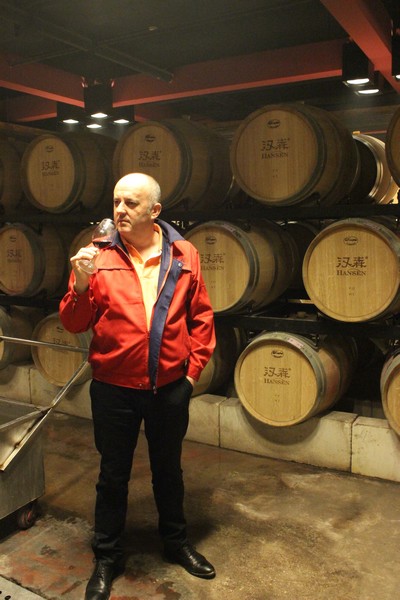 |
|
Paumard is a veteran winemaker in the Inner Mongolia autonomous region. |
Paumard believed the woman was the one he was looking for.
He quit his job in France and began a wine distribution business in Beijing. The woman became his wife two years later, and gave him the Chinese name Fa Jiulong, which means "French Wine Dragon" because he was born in the Year of the Dragon.
"My life in France is great, but I'm not sure whether I should go back now," he says.
"People here are too nice to me, which makes me feel like being on another planet compared to when I'm in France."
He's mutually cordial.
He greets every worker at the winery in simple Chinese, even though he doesn't know all of their names.
Paumard's hometown of Angers in France's Loire Valley is a globally celebrated hub for top-level wine. He grew up near a vineyard and became a sommelier at age 15.
He later went around Europe to look for new opportunities and became a finalist in 1989 Best Sommelier of the United Kingdom competition.
When he returned to his hometown in the early 1990s, he taught wine tasting in a local school and became a winemaker. He was also one of few experts setting prices for wine auctions in France.
While his Beijing business did well, he decided to go to Wuhai in 2010 to take advantage of its terrain.
The city gets more than 3,000 annual sunshine hours and experiences big temperature differences between night and day, which are good for grapes.
However, Inner Mongolia's heavy drinking customs shocked him.
"People always cheer, saying ganbei (empty your glass) in honor of guests. If the ganbei I have in Beijing means drink one, in Inner Mongolia, maybe I'd have taken 10. But I am a good drinker. People often get drunk earlier than me."
Paumard travels around China and returns to Beijing, where his wife lives, a few times a month. But he mostly stays at the chateau, where he's the only live-in employee.
For Angers natives, wine tasting is more of a lifestyle than a hobby. Paumard believes those who've studied wine might be good ecologists but can't be great winemakers without powerful passions for life.
"Many Chinese winemakers lack experience in the vineyards and focus on the winery work, and that is a major deficiency compared with the world's top-level winemakers," says Paumard's colleague Wang Shuchao.
"But we're catching up."
There are also conflicting ideas about winemaking. The winery's chief technician Kang Dengzhao says Paumard insists French convention forbids over-processing. This leaves some sediment but also preserves flavor.
However, many domestic wineries filter wine for years of sediment-free quality to better accommodate Chinese customers' tastes.
The two sides finally compromised and agreed that no sediment will appear within the first year after the wine is bottled, which is the minimum period permitted by China's national standard.
"I am glad they let me have the final say in most cases," Paumard says, laughing.
Paumard says some French people still know little about China and hold stereotypes because of political reasons.
He believes good Chinese wine could be more effective at washing away prejudices than political discussions.
"My friends from France visited our vineyard and winery, and shouted: 'A few days ago, we didn't know Inner Mongolia, but now we find you do more business than Bordeaux! It's impossible!'"
Paumard has also led the winemakers to explore some vineyards farther south along the Ningxia Hui autonomous region's Helan Mountains. He's glad both regions enjoyed big harvests in recent years.
"We can never become Lafite, because we don't have their long history," Paumard says.
"But we don't have to be. As long as we can overcome the cold weather during winter, the world's best wine can be produced in the Gobi Desert."
Chateau Lafite Rothschild is probably the French wine brand that's best known among Chinese.
"Maybe I will hold a blind tasting to invite the world's top winemakers in two or three years," he says.
"I can't wait to see how many of them have the right answer and can tell which is my wine and which is a Lafite."
Yang Fang contributed to the story.
